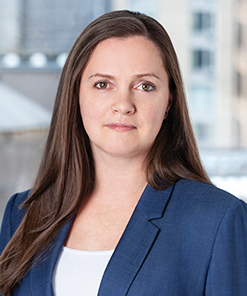Barclays’ innovation team rises to the fintech challenge
Kirsty Rutter, chief innovation officer at Barclays UK, describes to Joy Macknight how the bank is using its fintech platform, Rise, to find the right start-ups with which to partner to deliver value to its business lines.
Barclays’ fintech accelerator programme, the flagship initiative in its Rise network, has evolved since its launch in 2014. While it helped to build the bank’s reputation in the fintech community, previously there was a disconnect between the lab and the bank. This was deliberately changed when Kirsty Rutter, chief innovation officer for Barclays UK, joined in June 2017.
Ms Rutter’s mission is twofold: to work with the bank’s business lines to understand their strategic objectives, and to find partners in the fintech ecosystem to co-create with and deliver on those strategies.
Career history: Kirsty Rutter
- 2017 Barclays, managing director, chief innovation officer for Barclays UK
- 2017 UK Ministry of Justice, chief risk officer
- 2016 Eaton Risk Advisory, director
- 2012 Credit Suisse, managing director, strategy, risk and control
“We are focused on partnerships that are beneficial to both sides,” she says. “As a bank, we offer scale and access to an extensive client base, from consumers to large corporates. The start-ups offer us incredible focus, clarity of vision and drive to execution. Through a symbiotic relationship we can learn from each other and, as a result, are both in a better place for having worked together.”
Rise up and engage
In late November 2018, Ms Rutter was deep in the selection process for the London accelerator’s latest cohort. More than 700 start-ups competed for 10 places on the 13-week programme, run in partnership with Techstars. To strengthen the connectivity between the fintechs and the bank, she made it a rule that no start-up could join selection day unless actively sponsored by a business line, which ensures greater engagement up front.
After whittling down the applications to about 40, the innovation team identifies key business contacts in the areas best suited for each solution. Then 20 start-ups are chosen to pitch directly to the business stakeholders. “The conversation quickly homes in on the commercial opportunity and where the start-ups could help move the needle and challenge us by bringing in new thinking and new technology applications,” she says. Her team spends a lot of time with the start-ups both during the programme and after, running extra sessions such as legal and procurement surgeries.
The accelerator forms part of Rise, Barclays’ wider community for fintech start-ups and corporates in financial services. Located in five sites worldwide, Rise also provides a co-working space for residents outside of the accelerator programme. In addition, Rise members gain access to a bespoke set of training, workshops and events, and opportunities to connect with Barclays’ network of clients, partners, investors and experts.
Hands across the bank
In April 2018, Barclays transferred its UK retail and business customers to its ring-fenced bank. While Ms Rutter’s primary focus is to manage what sits inside the ring-fenced entity, the innovation team looks across the group, covering corporate and investment banking, as well as cards and the digital bank proposition in the US.
“Each of us has a specific coverage role – for example, I am developing opportunities in the retail space – but I also know what the other side of the organisation is doing,” she explains. Ms Rutter ensures Barclays is repurposing solutions that can solve multiple product and business opportunities.
She believes the innovation team’s biggest success to date has been its impact on shaping cultural change. “This can’t be underestimated; to stay ahead requires us to operate in a different way,” says Ms Rutter. “But there is a need to see what the art of the possible is before people can understand the change that is coming fast. We are bringing intelligence and insight to the businesses to help them to shape new opportunities, resulting in interesting new products and services.”
Open Banking opportunities
Following the UK’s Open Banking launch a year ago, Barclays was one of the first of the mandated Competition and Markets Authority 9 banks to roll out account aggregation using application programming interfaces. Ms Rutter sees the Open Banking initiative in the context of an open data paradigm and the “enormous” opportunities this opens up. But receiving masses of data from a sector, peer group or competitor becomes less of an opportunity and more of a challenge if a bank does not know what to do with it, she insists.
“We need to be clear as to strategic intent and the purpose of having that data is to help service our customers. Otherwise it is not adding value to new propositions. While Open Banking helps us to expand our model, we now have to look at what information we need to reach the desired outcome.”
The skills gap in the UK and beyond is something Ms Rutter is keenly aware of. “We need to re-engineer the hiring process and have diverse skills and thinkers at the table to ensure a robust debate and, ultimately, land at that customer-oriented outcome, especially at a time when the customer, industry, technology and environment are all changing so quickly,” she says.
“In this transition period, we also need to redefine how education is positioned – because thinking and creating, philosophising and designing, experimenting and taking calculated risks are going to be the skills the next generation will need to be successful.”



